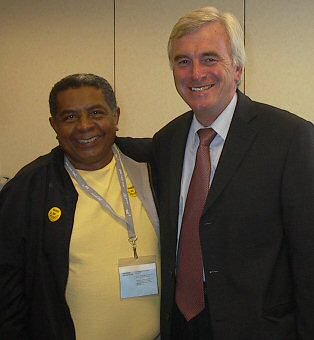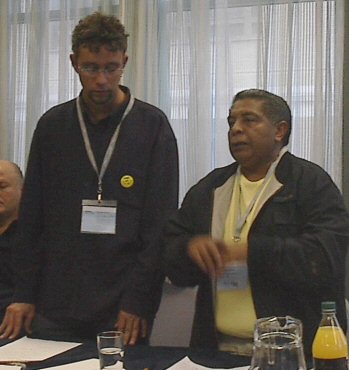Orlando Chirino addresses British Trade Unionists at Hands Off Venezuela fringe meeting
- 15 September 2005
Venezuelan trade unionist Orlando Chirino, national coordinator of the UNT, addressed a room filled with over 50 delegates attending the Trade Union Congress in Brighton on Wednesday 14th September at the Quality Hotel. The meeting was organised by the Hands Off Venezuela campaign.

The UNT representative shared the platform with FBU President, and Hands Off Venezuela sponsor, Ruth Winters, John Wilkin, NATFHE President and the mover of Motion 79 (see article) and Jorge Martin, International Secretary of the Hands Off Venezuela campaign. Jeremy Dear, General Secretary of the NUJ chaired the meeting.
Jeremy Dear opened the meeting by saying that the “TUC is the first European Trade Union confederation to give support to the Venezuelan revolution” noting the motion that had been unanimously passed earlier that evening at the plenary of the Trade Union Congress.
After his opening remarks, John Wilkin took the floor to reiterate what he had said in his speech to the TUC, “what we need in Britain is a bit of Bolivarianism.” The NATFHE leader had recently been to Venezuela and had clearly been inspired by what he had seen. He said that he agreed with Richard Gott’s analysis about the Bolivarian Revolution being a “slow motion revolution” but he added, “It is a revolution anyway.”
 |
Orlando Chirino and John McDonnell |
John Wilkin gave a good account of the achievements of Venezuela’s Bolivarian revolution. He focused on what has been achieved in the education system and talked about the inspirational and unique experience of Venezuela’s Bolivarian University. This institution really represents the values of the Venezuelan revolution.
After the defeat of the criminal lock-out that crippled Venezuela’s economy at the beginning of 2003, huge buildings that had been used by corrupt PDVSA (state oil company) management for their own entertainment had been taken over by the people and used to host the Bolivarian University. The aims of this new institution are to help boys and girls from very poor backgrounds to get into higher education. These students receive all the help possible to overcome any financial and social difficulties.
The NATFHE leader also pointed out the huge scale of involvement of the Venezuelan masses in the revolutionary process when he said, “the level of involvement and commitment is amazing.”
Ruth Winters started off her speech by saying that she enjoyed speaking at fringe meetings because she had the chance to speak for more than three minutes, “unlike at the plenary conference, where ministers and business experts are allowed to lecture us about privatisation.” That was a clear reference to the fact that the rightwing chancellor Gordon Brown had addressed the congress the day before.
The firefighters’ leader expressed her pride at being among the founders of the Hands Off Venezuela campaign and she linked it to the long history of internationalism of the FBU. They have always been very supportive of the Palestinian cause, the Colombian trade unions and now Venezuela’s revolution.
Although she recognised her lack of a deeper knowledge about Venezuela ‑ because she had not had the chance to visit it yet ‑ she said that it was very important to work together within the TUC to get motions like motion 79 passed and wage serious solidarity work. “We have to work together on the left and in the trade unions, because if we don’t work together the Venezuelan people will suffer.” This was a clear warning to those who wish to split solidarity movements such as the Venezuelan solidarity movement.
 |
The audience |
Then came the main speaker, Orlando Chirino. He opened up by saying, “Bolivarian and revolutionary greetings to the British trade unionists on behalf of the Venezuelan working class”. After sending fraternal greetings to all Hands Off Venezuela supporters that had made his first visit to Britain possible, the Venezuelan trade unionist gave a very comprehensive account of Venezuelan history that can be summed up in the following points:
- February 1989. IMF sponsors austerity measures that seriously undermine the living conditions of the Venezuelan people and provoke riots known as the ‘Caracazo’. The brutal repression leaves a death toll of 6,000! As Chirino said, “since those at the top could not rule like they did before and the ones at the bottom would not allow themselves to be ruled in the same way”.
- February 1992. Military rebellion carried out by patriotic army officers and headed by Hugo Chavez fails.
- 1993. There are elections where the ‘The Radical Cause’ candidate who is backed by the working class wins, but he is outmanoeuvred by the right wing that manages to replace him with Rafael Caldera.
- 1994. Hugo Chavez is released from jail.
- 1998 and 1999. Hugo Chavez wins the elections with an overwhelming majority in spite of the campaign of slander and lies that the traditional parties launch against him. There is a constitutional process that involves millions of Venezuelans and results in the creation of the new Bolivarian constitution.
- 2001. 49 Enabling acts are passed. These laws state the public character of the natural and economic resources of the country such as the land and oil.
- 2002. The so-called “democratic opposition” fights back against these 49 decrees and they stage a coup d’etat in April and a lock out at the end of the year. The coup d’etat is defeated by the spontaneous action of the masses. The lock out provokes the direct intervention of the working class to defeat it. During the 63-day lock-out the workers show that they are capable of running industry without the bosses or management. “It was a revolutionary success” Chirino said. There is evidence that US imperialism is involved in all these attempts to overthrow the Chavez government.
- 2004. The opposition forces the calling of a recall referendum to try and remove Chavez from the presidency. The revolutionaries win by an overwhelming majority.
Orlando Chirino also gave an account of all the social programmes that have been implemented. The fact that the Venezuelan masses managed to regain control of the oil industry, combined with the high price of oil, has made these reforms possible.
The birth of the UNT is the result of the defeat of the sabotage carried out in the oil industry and throughout the whole of the Venezuelan economy at the end of 2002. “The CTV acted as an agent of imperialism” Chirinos said. The CTV allied itself with the imperialists and the Venezuelan bosses; therefore they lost any right to represent Venezuelan labour.
He said that once the UNT manages to do away with the remnants of the CTV they will erect a monument upon the ashes of the CTV and there will be an inscription that will read “Never again will a workers’ organisation ally itself with imperialism to kill class brothers and sisters”.
Comrade Chirino also touched the process of co-management in different companies such as INVEVAL (valve construction), INVEPAL (paper mill) and Alcasa amongst others.
 |
Jorge Martin and Orlando Chirino |
The UNT leader explained that his trade union confederation has presented a bill to accelerate the process of establishing co-management and workers’ control within the state and private companies. He described co-management as the “learning process for the working class to run the country on their own.” He ended by welcoming the current debate that is taking place around the issue of socialism.
After his speech questions and answers followed. The meeting was a very inspiring one and it that has helped to raise awareness among the active layers of the trade union movement in Britain about what is really happening in Venezuela. It represents another big step in the work of consolidating solid links between the Venezuelan and British trade union movement.

 Please help build the campaign by
Please help build the campaign by